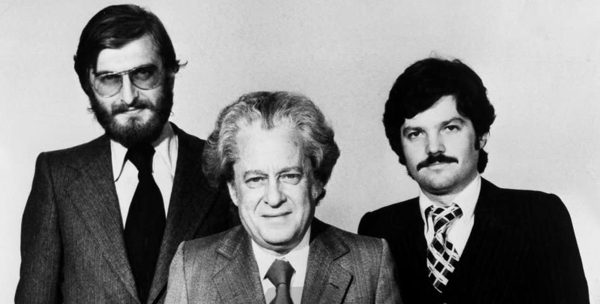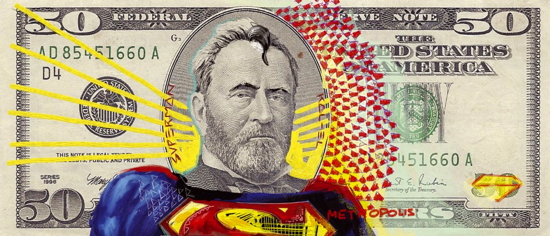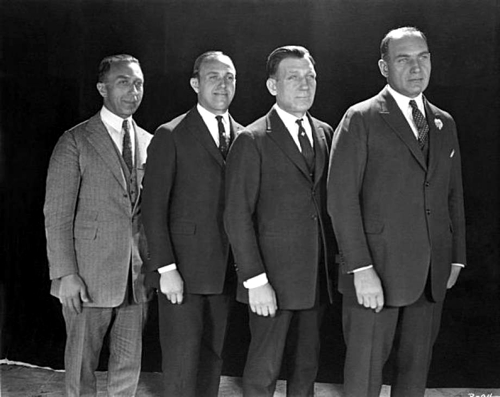The telephone trills.
It’s mid-November 1978 in sunny Los Angeles, and all four of the Warner Brothers, seated at their identical desks, reach for their four matching telephone receivers. “Hello?” they chirp, in unison. “These are the Warner Brothers.”
“Good afternoon, Mizter Brothers,” says the voice, in an imaginary Russo-Swiss-Mexican accent. “Zis is Alexander Salkind.”
Mr. Salkind is the executive producer of Superman: The Movie and the head of a bumbling, crumbling international crime syndicate, and he’s making a transatlantic person-to-persons call to make Warner Bros. an offer that they can’t refuse.

In this unrighteous reach out and touch someone, Alex explains that today he’s going to sell them the distribution rights to Superman in several more foreign territories, for the generous asking price of $15 million dollars, payable immediately and without question. He wants cash, and he wants it right away, and if they don’t pay it, he won’t give them the completed print of the movie in time for the US premiere.
This is an actual thing that happened in the world.
Warner Bros. had already paid the Salkinds $10 million dollars for distribution rights in the United States, Canada and 75% of the international markets. Now, for the bargain basement everything-must-go fire-sale price of 150% more than they’d already spent, Warners would get the rights for Africa, Australia, Puerto Rico, Japan, Hong Kong and Singapore, which is delightful but it wasn’t what they figured they’d be doing with the petty cash today.
And that was the final price, too: $15 million dollars. This was not a negotiation. It was a stick-up.
Now, you’d imagine that this kind of thing couldn’t happen, because obviously Warners would already have contracts specifying the delivery date of the film. But that’s because you’ve never done business with the Salkind family. When the stunned studio heads looked closely, they found that the delivery date in the contract was December 31st, 1978 — three weeks after the US premiere. Apparently, Warners didn’t check that contract carefully enough before they signed it.
Movie studios would be more rigorous about this in the future, obviously. Most of the best practices in the film industry were developed in the wake of a Salkind project. They were educational that way.

Warner Bros. had already committed to a $7+ million dollar promotion campaign, including a saturation-bombing television ad buy on all major networks, telling everybody that Superman was coming directly to theaters, starting December 15th.
Warners had gone to all the trouble of booking 508 movie theaters for a guaranteed 13-week run, plus they had a Washington, D.C. premiere with President Jimmy Carter on December 10th, and a London premiere with the fucking Queen of England on December 14th.
And here’s this runty card sharp with blue-rinsed hair, calling the studio collect, and telling them that everything will be fine, as long as they pay the $15m ransom in unmarked bills. They’re going to get the movie, nobody’s saying they won’t get the movie. This is going to be one of those win-win scenarios.
Naturally, the studio asked what the Salkinds wanted it for, and Alex said, vhat are you talking about? It’s money. It’s just a thing that you want to have more of.

Really, the problem was that Salkind’s investors were tired of shoveling other people’s money through a series of shell companies and secret bank accounts without getting anything in return. They wanted some sugar. And they were demanding it less than a month before the movie came out, so these were some impatient investors. If this is the way the Salkinds behave, just imagine the people who are demanding 15 million from them.
You know, it makes you wonder what would have happened, if they’d had some kind of good influence during this period in their lives, some symbol of honesty and fair play that could have inspired them. Well, I guess we’ll never know.

So Warners paid the ransom, of course. What else could they do? They had to have the movie. They were planning a preview screening in late November, and Richard Donner flew to LA to see what the audience reaction was like. But they had to cancel the screening at the last minute, because they were still arranging for the wire transfer, and Alex hadn’t sent them the film yet. They finally fixed it all up, just a couple days before the D.C. premiere.
As it turned out, Warner Bros. actually made money on the deal; the film made $60 million overseas. One studio insider said that “Warner was led kicking and screaming into making millions.” If the Salkinds hadn’t been so panicked about raising the money in a hurry, they could have made a lot more money by holding onto those distribution rights. But that’s the way the Salkinds operated; it was like watching the Mafia tumble backwards down a flight of stairs.
A couple years later, the story broke in The Los Angeles Times. Nobody at Warners would actually talk about it on the record, because they were still waiting for the Salkinds to deliver Superman II, and why ask for trouble? All the Times could get was a quote from an unnamed Warner exec, who shrugged, “It has to do with risk and reward; what you are getting for what you are held up for. Besides, it was a business decision, and imparting an ethical coefficient I don’t think is relevant.”
Well, you know me; I wouldn’t dream of imparting an irrelevant ethical coefficient. I’ll just say that the story ended happily for everyone, except for Alex, who was arrested a couple of weeks later for embezzling funds, and he had to flee to Mexico, and miss the movie premiere. Seriously, that is the actual thing that happened next.
Tomorrow:
Meanwhile, in the actual film…
1.95: Speak Truth to Power

— Danny Horn

Unfortunately, all of the Warner brothers were gone from the studio by 1978. It would have been interesting to see the Salkinds go up against Jack Warner in his prime.
So he was arrested for embezzling funds! If “The Producers” hadn’t come out over 10 years earlier, I would have thought Mel had been inspired by Alexander.
LikeLiked by 2 people
I don’t think the Warners would have gone into business with the Salkinds- they wouldn’t have given any outside group the degree of control over their business that they required. Now Harry Cohn, there was a guy who offloaded substantial areas of risk onto external stakeholders (by which I mean he was mobbed up.)
LikeLiked by 4 people
So… he was dealing with the Warner sister Dot? You know just for fun she ran around the Warner movie lot.
LikeLike
Wow. Just wow.
Nice film ya got there. It’d be a SHAME if anything were to happen to it, y’know?
Is this why the Completion Bond for movies started to become a thing? That to get a promise of buying the finished film, the producers had to have an insurance company ready to pay for running over budget, with the right to take over the film if that happens?
“They found that the delivery date in the contract was December 31st, 1978 — three weeks after the US premiere.”
Looks like it was a mistake to hire Otis as their attorney.
I guess we now know when the Facepalm was invented.
I’m also amazed that throughout all of this, Donnor would have started work and kept on working without ever getting a budget. How can anyone agree to do a project, if they don’t know how much money is available for the project?
I wonder if there may have been some new Directors Guild rules after this too, like the right to know what the budget is before production starts?
On yesterday’s comment, I put in the list of films one per line, like John E Comelately. But the list was smashed together into a wall of text paragraph. Is there a code to put in the text box for llists to stay one item per line?
LikeLiked by 1 person
I edited both your post and John’s, to make them shorter. Both posts were taking up a lot of space, and weren’t directly relevant to what we’re talking about. I’d prefer not to have super-long comments that are just lists of popular movies.
LikeLiked by 1 person
I’ll try to keep my OCD in check… 🙂
LikeLiked by 1 person
So the Salkinds are the types of people who get laws named after them, then sue the lawmakers for naming rights. From prison, where they are serving several life sentences.
LikeLiked by 2 people
Wow! I had no idea this had happened! 😲
LikeLiked by 1 person
Looking at the picture of the trio near the top of the article, I can’t help but think, “Pictured (l to r): Non, General Zod, Ursa”. Is it just me?
LikeLike